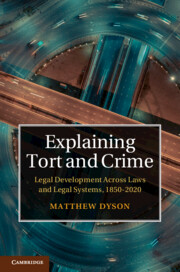Book contents
- Explaining Tort and Crime
- Explaining Tort and Crime
- Copyright page
- Contents
- Foreword
- Preface
- Table of Cases
- Table of Legislation
- Part I Setting the Scene: Introduction and Methods for Explaining
- Part II Mental States and Careless Acts: The Development of Fault Doctrine in Crime and Tort
- 3 Fault Doctrines in Criminal Law
- 4 Fault Doctrines in Tort Law
- 5 Explaining the Criminal and Tortious Developments in Fault Doctrine
- Part III Procedures Interfacing Tort and Crime
- Part IV Conclusions
- Index
4 - Fault Doctrines in Tort Law
from Part II - Mental States and Careless Acts: The Development of Fault Doctrine in Crime and Tort
Published online by Cambridge University Press: 07 July 2022
- Explaining Tort and Crime
- Explaining Tort and Crime
- Copyright page
- Contents
- Foreword
- Preface
- Table of Cases
- Table of Legislation
- Part I Setting the Scene: Introduction and Methods for Explaining
- Part II Mental States and Careless Acts: The Development of Fault Doctrine in Crime and Tort
- 3 Fault Doctrines in Criminal Law
- 4 Fault Doctrines in Tort Law
- 5 Explaining the Criminal and Tortious Developments in Fault Doctrine
- Part III Procedures Interfacing Tort and Crime
- Part IV Conclusions
- Index
Summary
Fault doctrine in tort law has been characterised by its context-sensitivity, its adaptability and its comparison with relatively narrow islands of strict liability torts. Unlike some other legal systems, English tort law does not have a general clause of liability, nor presumptive liability for conduct which caused harm and was done with fault. Instead, English law developed specific causes of action in civil law, called torts, with specific configurations of physical requirements and fault. Not all torts can be covered here; the focus will be on some of the more common and/or significant torts. It is also necessary to look a little further back to understand developments in our period, in particular how tort, as a subject, was pulled together in the nineteenth century, particularly by judges.
- Type
- Chapter
- Information
- Explaining Tort and CrimeLegal Development Across Laws and Legal Systems, 1850–2020, pp. 108 - 219Publisher: Cambridge University PressPrint publication year: 2022



